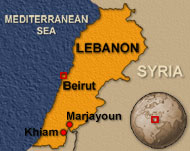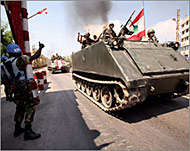Lebanon army reaches Israel border
The Lebanese army has reached the country’s southern border with Israel for the first time, sending a sole jeep on patrol through Kfar Kila, a village from which Israeli forces withdrew in 2000 and ended an 18-year occupation.

On Friday, the army jeep, flying a large Lebanese flag and carrying just two soldiers clad in green camouflage uniforms, passed by the Fatima Gate, a few metres from the border in Kfar Kila, but did not stop.
Villagers throwing rice and Hezbollah supporters holding banners have welcomed the country’s army to the south after a nearly 40-year absence.
About 15,000 troops are eventually supposed to deploy in the region under a peace plan aimed at securing an end to more than a month of fighting between Hezbollah fighters and Israel, but so far the troops have deployed mostly to predominantly Christian towns including Qleia and Marjayoun.
Overnight, Lebanese forces arrived in the largely Shia Muslim village of Khiam in the same area, said Lebanese Brigadier-General Charles Sheikhani.
The UN said a fragile ceasefire that started on Monday was holding, and peacekeepers set up checkpoints in two southern towns after that were both scenes of fierce fighting – Yater and Hadatha – after Israeli soldiers withdrew.
Qana burial
In Qana, 29 people including 15 children who were killed in an Israeli air strike on July 30 were buried during a mass funeral, one of several that took place in southern Lebanon. One street banner read: “These people are heroes. They woke of up the world.”
An Associated Press count – gathered from witness accounts and officials of the Lebanese Red Cross and civil defence corps – had put the death toll from the strike at 28. It was not immediately clear how to reconcile the higher figure.
Two Hezbollah fighters were also buried in Qana, where scores of cars moved around town with Hezbollah flags.
 |
|
Lebanese forces earlier arrived in |
Sheikhani said he would not deploy troops permanently to Kfar Kila until a border fence destroyed by invading Israeli soldiers last month was repaired and all Israeli soldiers there withdrew.
An Associated Press reporter visited the town on Thursday and early on Friday, however, and saw no Israeli soldiers. Residents in Kfar Kila said Israeli forces had already pulled out.
“Maybe today we’ll patrol Kfar Kila, but if we deploy forces there, it doesn’t mean we’ll put soldiers in the village” to stay, Sheikhani said earlier on Friday.
The army’s 10th brigade has set up camps within a kilometre of the Israeli border – a key step towards taking control of the whole country for the first time since 1968 and a major demand of the UN resolution that so far has halted the fighting.
The deployment marks the first time the Lebanese army has moved in force to a region that was held by Palestinian fighters in the 1970s and by Hezbollah since Israeli soldiers withdrew from the area in 2000.
“We are all very happy,” Sheikhani said. “It’s our country. and this is the first time we’ve really been in south Lebanon.”
Towns in ruins
The area of Lebanon’s border with Israel is in ruins. In the towns of Adaisse and Taibeh, south and west of Kfar Kila respectively, it was difficult to find a building that was not blackened, pockmarked by artillery or flattened altogether.
On Thursday, the only traffic in the towns was young bearded men zipping around piles of wreckage on motorcycles. They spoke quietly into two-way radios, occasionally dismounted to kiss one another on both cheeks, then zipped away.
 |
|
People have welcomed the army |
One had a handgun tucked into his belt. Another threw an AK-47 rifle into the back of a pickup truck when a reporter approached.
Sheikhani said Lebanese troops would assist in the reconstruction effort, but he gave no details.
Marjayoun mayor Fouad Hamra said on Friday he welcomed the Lebanese army but much needed to be done to rebuild.
“As far as security, people are very co-operative with the military coming in and helping them, but the needs are a lot, the needs are great – water, electricity, food, medicine, plus psychological problems later.”